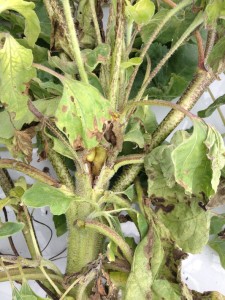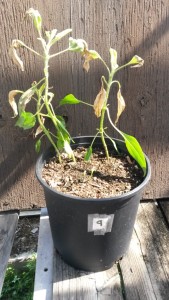Paul A. Baumann, Josh McGinty, Gaylon Morgan:
The answer to this question may be due to herbicide resistance. Glyphosate (Roundup) herbicide is very effective for controlling weedy sunflower species. However, in 2014, there were several instances where sunflowers sprayed at the appropriate stage of growth survived in Central Texas. In most cases, glyphosate activity was initially observed at the growing points; however, the plants later re-sprouted from the lower stem and were able to reproduce before crop harvest. See Figure 1. . Seed was collected from plants at nine locations in the Granger and Snook areas and planted in a bioassay study by Dr. McGinty at the Corpus Christi Texas A&M Research and Extension Center. During initial screenings, many of these plants indicated some tolerance to recommended application rates of glyphosate. See Figure 2. At this point, two seed sources from both the Granger and Snook collections have been advanced to further studies for confirmation of resistance. Please understand, declaration of herbicide resistance in plants is not a simple task and takes a considerable amount of time. Many factors can contribute to non-performance of a herbicide, such as improper application timing, sub-labeled application rates, application “skips” and climatic conditions to name a few. Herbicide resistance is an anomaly in most cases, but does occur. We have documented glyphosate resistant Palmer amaranth and common waterhemp pigweed in the state but it seems we might be adding to the list. However, further greenhouse studies must be conducted before we declare these seed sources resistant.
What this means to our production clientele is pretty simple. If you had trouble controlling sunflowers in the past, despite doing everything right, you may have herbicide resistant biotypes of sunflower in the field. This is especially true if you farm in the Granger or Snook area. If you suspect resistance, use another herbicide effective for controlling sunflower, in combination with or in lieu of glyphosate. If you use a combination product with glyphosate, you can still get the benefit of its’ wide spectrum of weed control, along with management of potential resistant species.

Figure 1. A sunflower plant that survived and is regrowing following multiple applications of label rates of glyphosate from Williamson County.

Figure 2. Sunflower from the Granger, TX area 14 days after treatment with 24 fl oz Roundup PowerMAX. Note the new growth beginning at the base of the lower leaves of these plants.